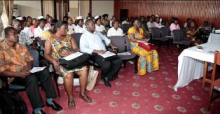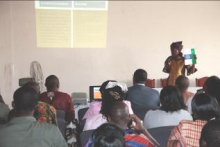Ministry of Health disseminates Standards for Adolescent Health Services
The Ministry of Health and Sanitation (MoHS) in collaboration with WHO and other partners held a one day meeting on 24 January to disseminate the National Standards for Adolescent and Young People Friendly Health Services. The standard was developed by the Directorate of Reproductive and Child Health with technical and financial assistance from WHO. The Stand-ards elaborates the key elements of quality services that are essential and that should be available, accessible and affordable to adolescents and young people in health service delivery points in the country.
Adolescents and young people constitute approximately 40% of the country’s population. However, a situation analysis on adolescent health revealed that very few health care practitioners are trained in the delivery of adolescent health needs; and that only few clinics are adolescent friendly.
Dissemination of the standard will help to accelerate the quality of services to meet the health needs of adolescents and young people in health facilities. The dissemination ceremony was attended by sector partners including line ministries, UN agencies, nongovernmental organizations, civil society, the media, health workers and other partners.
Speaking at the function, Dr Lynda Foray-Rahall, Manager of Reproductive and Child Health at MoHS expressed appreciation to WHO for its support and the strategic contributions of other stakeholders in the development of the Standards. She urged the partners for continued support in its implementation at service delivery levels. Mrs Patricia Bah, the Manager of the National School Health, Adolescent and Teenage Pregnancy Programme at MoHS emphasized the need for continuum of trainings of health workers, strengthen-ing of supervision as well as community involvement in addressing adolescent health needs and challenges.
Addressing partners on behalf of the UN Country Team, Dr Jacob Mufunda, the WHO Representative in Sierra Leone commended the government for prioritising adolescent health and for highlighting teenage pregnancy in particular for strategic policy action. He noted that the behaviours, lifestyles and health status during adolescence will influence health both in the present and in the future. While assuring WHO continued support, Dr Mufunda stressed the need for effective implementation of the standards to realize better outcomes.
In order to address some of the challenges in adolescent health services, the government and sector partners have developed key tools to enhance the provision of quality adolescent-friendly health services. These include: (i) Strategic Plan for Adolescent and young people’s health and development; (ii) Standards on adolescent friendly health service delivery; (iii) National Train-ing Kit on adolescent health for health care providers and (iv) job aids. Train-ings are also underway to improve health service delivery to young people.
Ministry of Health disseminates Standards for Adolescent Health Services



